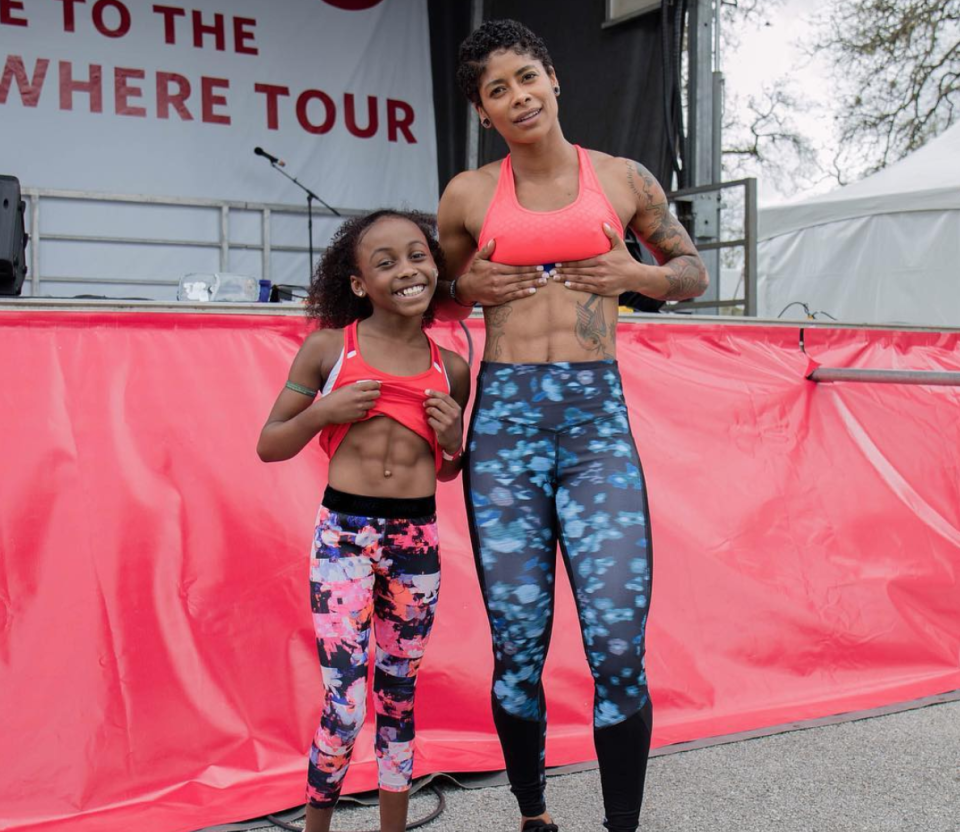This 10-year-old has six-pack abs and people are impressed — and a little confused
A photo of a 10-year-old girl with shredded abs is inspiring both awe and concern on social media.
Chandler King is a tween gymnast and an Olympic hopeful living in Houston with 171K followers through her fitspo Instagram account. While the mini athlete has made headlines for the past few years, she dipped back into the spotlight Tuesday when popular fitness trainer Massy Arias shared a photo with Chandler — both of them showing off their ripped abs.

“Look guys…finally meeting @chandler_king_ in Houston. What a little beast,” wrote Arias. “Our kids are a reflection of the environment they are in. I’m not sure what’s your reason for getting fit, but if you’re a parent, that’s enough motivation to become your kid’s biggest role models.”
A post shared by MankoFit (@massy.arias) on Feb 26, 2018 at 3:39pm PST
Most people ‘liked’ Chandler’s impressive abs with comments such as, “Dang I’ve never seen abs like that on a ten-year-old before,” “That girl is a phenomenon of nature, natural talent,” and, “Wow … Yes, I’m in total agreement. My 4 boys love to workout with me. She is so fit to be so young. I love it!”
However, many expressed concern that an emphasis on extreme fitness was inappropriate for an adolescent: “Children should focus their attention on playing and discovering the world, not on getting fit…” one person wrote.
“To each his own. In my opinion, a 6 pack for a child is too much, but everyone has a right to do whatever they want with themselves and their children,” said another.
The notion of kids hitting the gym may seem wild, but strength training can boost a growing body. According to the New York Times, research published in the journal Pediatrics found that among boys and girls ages 6 to 18, those who weight-train grow physically stronger without packing on too much bulk, and they also make more “efficient” neurological progress.
Another study, published in the journal Sports Health, found that regarding strength training, a child’s “physical, cognitive, and social maturity” are better predictors of readiness than one specific age, although children ages 7 and 8 are generally ready to take direction and achieve an appropriate balance.
“We realized that Chandler had an athletic gift when she cartwheeled around the house and had an unusual level of body control, unlike most 3- and 4-year-olds,” father RJ King tells Yahoo Lifestyle, adding that his daughter trains more than 30 hours a week and attends an education program provided at World Champions Centre, a facility owned by the family of Olympic gymnast Simone Biles.
King also emphasizes that his daughter doesn’t lift weights, and only uses the weight of her body to achieve her goals. He also says she eats a typical balanced diet, which, yes, includes noodles, ice cream, and cookies. “We don’t dictate Chandler’s diet, prevent her from eating anything, or force her into sports,” the father of two says.
“The first question is whether a child is genuinely interested in fitness or if their training and diet are being dictated from above,” Dusten Nelson, a Chicago-based strength coach who works with professional athletes, including Olympians, tells Yahoo Lifestyle. “As a coach, I have to pay attention to who or what is guiding them.”
The most common myth about young weight trainers is that physical demands can stunt growth. “That belief stems from an often-quoted study in the 1960s that showed Japanese kids who performed physical labor were shorter,” says Nelson. “However, those kids were also malnourished and lived in high altitudes, which research has connected to shorter heights. The truth is, many athletes might not be that tall to begin with.”
Another concern: Weight training will cause children to put on massive muscle mass. “Sex hormones like androgens contribute to muscle mass,” says Nelson. “And depending on the age — especially in prepubescent kids — the hormones haven’t reached peak levels.”
A post shared by Chandler King (@chandler_king_) on Sep 18, 2017 at 10:28am PDT
And although Chandler’s abs are definitely impressive, genetics and the structure of each individual’s abdominal wall can determine one’s ability to develop a six-pack. To that end, Nelson speculates that she is doing little else to achieve those abs aside from a clean diet.
That said, there are several precautions to be mindful of. Rodney McSwain, a military veteran and a personal trainer in Burford, Ga., tells Yahoo Lifestyle that kids should avoid nutritional supplements and protein powder due to unknown risks to their internal organs. And unlike adults, children may be unaware of underlying health conditions that would otherwise prevent them from putting their bodies under too much stress.
“Before a child does any type of intensive training, they should be under the supervision of a doctor,” Andy J. Bernstein, MD, a spokesman for the American Academy of Pediatrics and a physician at North Suburban Pediatrics in Chicago, tells Yahoo Lifestyle. “That includes a diet full of good fats, healthy sugars, and protein.”
“There are risks that early specialization can lead to burnout or injury to growth plates on the bones, but the injury would have to be specific and severe in order for that to occur,” he adds.
And there’s a general rule for young athletes, says Bernstein: “Ten to 15 reps of any exercise that kids can do comfortably is generally safe.”
Read more from Yahoo Lifestyle:
Parents are shaming Jessa Duggar for her ‘messy’ home. Do parents have to be neat?
Little kid gives up her ice cream money to help comfort teacher in mourning
Follow us on Instagram, Facebook, and Twitter for nonstop inspiration delivered fresh to your feed, every day.
